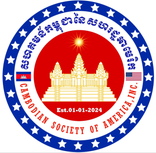Mission:
CAMBODIAN SOCIETY OF AMERICA, INC. (CSOA) A non-profit organization that seeks to inspire, encourage, Cambodian Americans and other Ethnic group to participate in Social, Cultural (or religious), Educational activities, but also working towards integrating them into mainstream America.
Vision:
• To provide opportunities to its members and other Ethnic groups to participate in Social, Cultural (or religious), and educational activities that will help to improve the lives of everyone in the community.
• To create awareness, inform, educate, support, promote, and advocate on issues of vital interests to Cambodian Americans and other Ethnic groups in the political, social, cultural, and economic areas in the community.
• To share and enjoy the commonality of experiences and to identify and celebrate the differences among Cambodian Americans.
Organization Views, Guidelines and Principles:
In the course of our work, CSOA has developed a set of principles that work as guidelines for all our projects.
The principles proceed from various sources – our natural instincts, the rich heritage culture of our home base in Cambodian, and our practical experience on the ground in United State of American by merging into a single philosophy of caring and sharing.
Transparency:
Being transparent means being open and honest in what we do, it means that the way we spend donations is always open to public examination means that all our programs and projects are open for all to see. It means that we always discuss everything we do with all of the people and agencies involved, seeking their input and advice.
Diversity:
We believe that diversity – the widest possible range of opinions, cultural backgrounds, languages and influences – is critical to the fullest expression of the human and all of its aspirations.
To that end, the Cambodian Society of America Inc. is committed to encouraging and protecting diversity as a key component of our projects and programs. That commitment keeps us sensitive to regional differences and languages, minority cultures and individual goals and preferences. At heart, we believe in and actively support the rule that in many ways we are one.
Fairness:
The fairness principle drives us to see both sides of every question, to strive for just outcomes that benefit everyone and to apple the benefits of our programs equally to every child who is within the orbit of our projects.
Fairness means treating everyone who is involved with the Cambodian Society of America Inc. – donors and sponsors, agency and government partners, teachers and social workers, committee members and the children whom we try to help – with equal respect.
Sustainability:
The old adage is: give a man a fish, feed him for a day, teach a man to fish, feed him for life. In the long run, our programs and projects must be sustainable if they’re to survive and bring continuous benefits to the people we’re aiming to help. We live in a world where the strain on resources, waterways, oceans, and air is so extreme that everyone must play a part in reducing our negative impact, and increase our capacity to create truly sustainable, long-term solutions to problems.
At every stage, from planning to implementation, we continually assess the environmental impact of what we’re doing, the possibility of introducing new, low-impact methods, and the ways in which we can ensure that financial support for these programs continues long into the future.
Inclusiveness:
In some ways, the principle of inclusiveness incorporates aspects of all the other principles – transparency, fairness, diversity, and sustainability – because to be truly inclusive in all that we do, we have to practice all of the other principles.
Being inclusive means that as much and as far as possible, what we do is “bottom-up” rather than “top-down” in theory and practice. It means that we include everyone concerned with our projects and programs from the very beginning and that we take notice of what people tell us that they need, and what they want us to do for them. It also means that we include input from the people themselves and that we always give them a voice in shaping our programs and projects.

